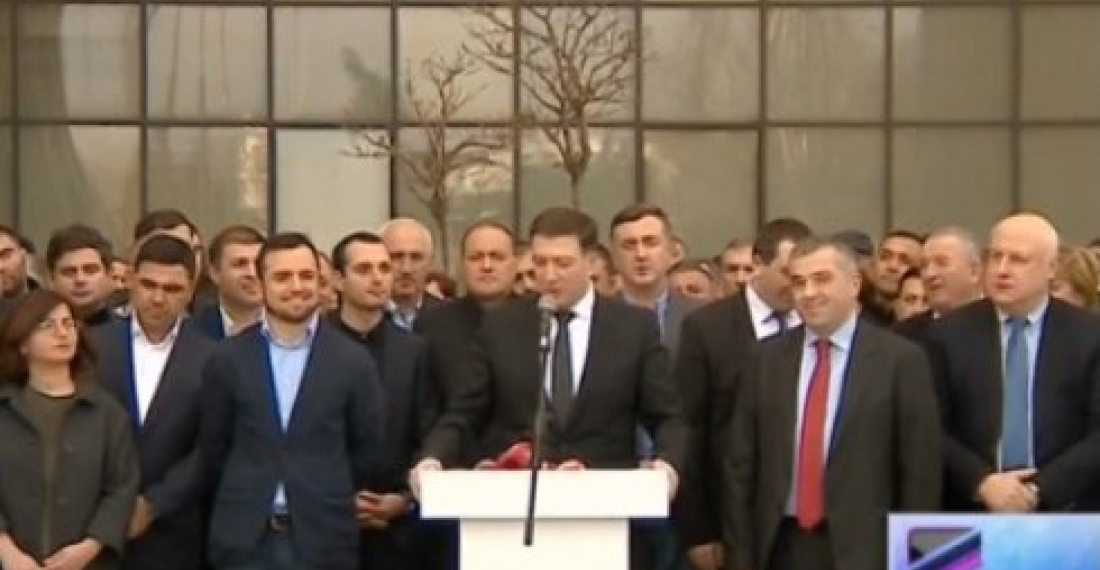This analysis was prepared by the editorial team of Caucasus Concise
As predicted, the process of re-configuration of Georgian politics, following last October's parliamentary elections, has now started in earnest. The political landscape is changing to reflect the new realities in the country and in the international environment, and this should be assesed positively.
The major change is happening within the main opposition party, the United National Movement. Following weeks of internal squabbles that spilled over into the media, the majority of the UNM members of parliament have now left to form their own political movement. The process was hastened once the former mayor of Tbilisi, Gigi Ugulava was released from prison in the first days of January. He endorsed the decision of other party leaders such as Gika Boleria, David Bakradze and others.
Bakradze, who is the leader of the opposition (formally called the minority) in the Parliament outlined the vision for the future "our political team, are looking ahead and beginning to build the future," Davit Bakradze was quoted by the website civil.ge as saying, whilst wishing success to those members, who decided to stay in the United National Movement. "We will definitely remain allies in the struggle against Ivanishvili's regime, but from today this political force and this political team begins a new stage of struggle aimed at changing the situation in Georgia for better, at finishing the Georgian Dream [party] and Ivanishvili's regime peacefully and returning development and progress to the country," he noted. Bakradze said that, for years, UNM's "face, backbone and pillar" was the team, which will continue its political activities separately using its "knowledge and competence"... "which sees Georgia's future in EU and NATO and "the key task of which will be to end confrontation in the country." Bakradze added that the team "has come to terms with the past" and that "nobody will be afraid" of its return to power. "Such a political force is being created today and I am sure that this political force will be successful on the Georgian political arena," Bakradze stated and added that "it is not correct to say that a team is leaving the party, because in reality the United National Movement is splitting today.
Bakradze's robust but conciliatory tone was in contrast to the language that former president Mikheil Saakashvili has used both before and after the October elections. Many in Georgia attribute the Georgian Dream victory to a rejection by the majority of Georgians of Saaksahvili and his tactics. Saakashvili however retains support amongst some grass root groups within the UNM, especially in western Georgia. It now seems the UNM will also have enough MPs still in the Parliament to be able to form a faction - an important issue if the UNM is to benefit from continued parliamentary resources.
Changes have also been taking place in other opposition parties that are not represented in the parliament. Most of the key personalities in the Free democrats, including its leader Irakli Alasania have resigned, and some have been given posts in the Georgian Dream government. The other significant development was the earlier resignation of former Parliamentary speaker, David Usupashvili, from the Republican Party. Usupashvili is still considered a heavyweight in Georgian politics, and this week he announced that he was in the process of setting up a new political formation, together with a number of like-minded people. There is increasing speculation as to whether the president of Georgia Giorgi Marghvelashvili will join this formation. Marghvelashvili was elected president in 2013 as a candidate of Georgia Dream, but broke with the party after differences emerged between him and the GD founder, Bidhzina Ivanishvili. Usupashvili ruled himself out from the next presidential election and said that the party will focus on the 2020 parliamentary elections.
The changes in the opposition may offer temporary satisfaction and succour to the Georgian Dream party in government, even though it currently enjoys a very large majority in parliament and is very secure in its position. However this is situation may change during the course of the life of the parliament. Many observers consider that the new political force that will emerge from among those that split off from the UNM will offer a strong opposition to the government. It is made up of seasoned and able politicians, and freed from the baggage of Saakashvili, is likely to be able to build bridges to the Georgian public very quickly. The new party led by Usupashvili is also likely to become very soon an important player, attracting liberals and the intellectual centre of the political spectrum. But the most important challenge for the Georgian Dream will come from within. Keeping together cohesion and unity in a party that has in the past prided itself to being a broad church will not be easy as the burden of government in difficult political and economic times starts to take its toll.
On the whole however the current changes in Georgian politics should be looked at positively. The political landscape is changing to reflect the new realities in the country and in the international environment. Most Georgian political parties and politicians remain firmly committed to Georgia's European and Euro-atlantic aspirations, and the ongoing changes are likely to strengthen this rather than weaken it. A strong and articulate opposition is also essential for a healthy democracy.
This analysis was prepared by the editorial team of Caucasus Concise, a weekly electronic newsletter published in co-operation with Commonspace.eu
photo: Members of the United National Movement announcing they were splitting away from the party to establush a new political formation, making their announcement on 12 January 2017.







